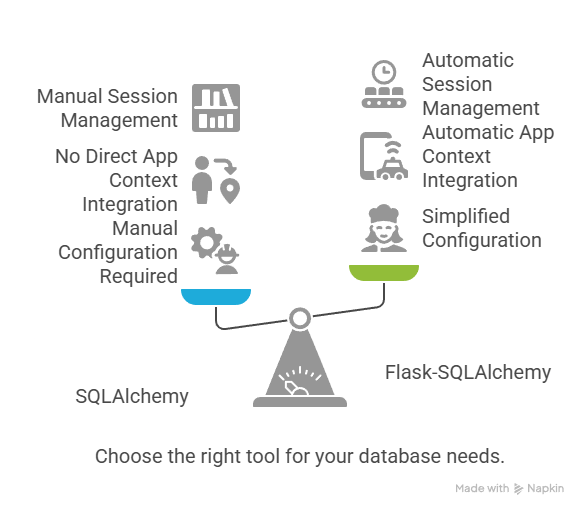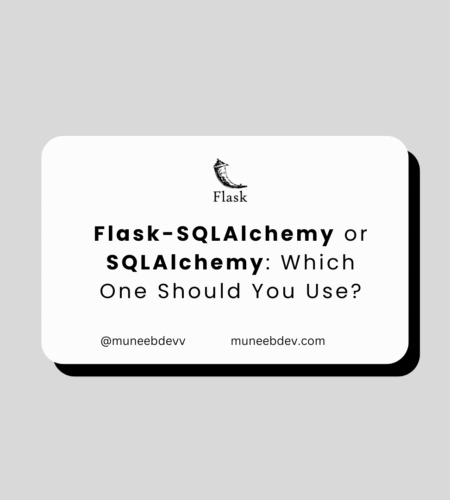Flask-SQLAlchemy vs SQLAlchemy — which one should you use for your Flask application? When building a Flask app that interacts with a relational database, choosing the right database management tool is a crucial decision. SQLAlchemy and Flask-SQLAlchemy are two of the most popular options. Both are incredibly powerful, but understanding the differences between them can help you make an informed choice for your project.
In this blog post, we’ll break down SQLAlchemy and Flask-SQLAlchemy, exploring what they are, how they differ, and which one is the best fit for your Flask application.
What is SQLAlchemy?
SQLAlchemy is a popular Python library used for database management and provides both a SQL toolkit and an Object-Relational Mapping (ORM) system. It’s highly flexible and works well with a variety of databases, including PostgreSQL, MySQL, SQLite, and more.
If you’re looking for a hands-on guide, check out how to connect Flask with MySQL using SQLAlchemy.
SQLAlchemy has two main components:
- SQLAlchemy Core: This is the low-level database interaction layer that gives you full control over your SQL queries.
- SQLAlchemy ORM: The higher-level abstraction that allows you to interact with your database using Python objects instead of raw SQL queries.
SQLAlchemy is not tied to Flask. It can be used in any Python project or web framework, providing advanced features for complex applications.
What is Flask-SQLAlchemy?
Flask-SQLAlchemy is an extension for Flask that simplifies integrating SQLAlchemy into Flask applications. It builds on SQLAlchemy’s ORM, but it adds convenience by making it easier to configure and use within the Flask framework.
Want to get started fast? Here’s a quickstart guide to Flask-SQLAlchemy.
Flask-SQLAlchemy includes several features:
- Easy setup: Flask-SQLAlchemy simplifies the setup of the database URI and session management.
- Flask integration: It integrates seamlessly into Flask’s app context, managing things like database sessions and transactions without requiring manual setup.
- Automatic migrations: Flask-SQLAlchemy works seamlessly with Flask-Migrate, providing an easy way to handle database schema migrations.
For a full list of features and advanced usage, you can refer to the official Flask-SQLAlchemy documentation.
SQLAlchemy vs Flask-SQLAlchemy: Key Differences
While both SQLAlchemy and Flask-SQLAlchemy provide powerful tools for managing databases, there are several differences that may influence your choice. Let’s take a closer look:

Why Use Flask-SQLAlchemy Over SQLAlchemy?
For Flask applications, Flask-SQLAlchemy is typically the better choice for several reasons:
- Seamless Integration with Flask: Flask-SQLAlchemy is designed to work seamlessly within the Flask ecosystem. It integrates with Flask’s app context, automatically handling things like database connections, transactions, and sessions. This means you don’t need to manually configure each component, which saves you time and reduces the complexity of your code.
- Simplicity and Ease of Use: Flask-SQLAlchemy abstracts many of the more complex configurations that are required when using SQLAlchemy alone. This makes it a great choice for beginners or for those who want to focus more on building their application rather than worrying about database setup.
- Automatic Session Management: One of the biggest advantages of Flask-SQLAlchemy is its automatic session management. In traditional SQLAlchemy, you must handle sessions manually, which can lead to bugs or complications, especially in larger applications. Flask-SQLAlchemy handles this for you, ensuring a smoother development process.
- Works Well with Flask-Migrate: Flask-SQLAlchemy integrates well with Flask-Migrate, a tool that helps you manage database migrations in Flask applications. This makes schema migrations easier to perform, as Flask-SQLAlchemy automatically integrates the migration system into your workflow.
Why Use SQLAlchemy Over Flask-SQLAlchemy?
While Flask-SQLAlchemy is often the go-to choice for most Flask developers, there are situations where you may want to use SQLAlchemy directly:
- Advanced Customization and Flexibility: If you need full control over your database transactions or need to work outside of Flask’s conventions, SQLAlchemy gives you the flexibility to handle everything yourself. This is useful for complex applications where you need to fine-tune your database interactions.
- Use in Non-Flask Projects: If you’re not using Flask and you’re working on a different framework or standalone Python project, SQLAlchemy is the ideal choice. It’s not tied to Flask and can be used in any Python application.
- Raw SQL Execution: SQLAlchemy’s Core provides advanced capabilities for writing raw SQL queries. If you need to perform complex database operations that go beyond simple ORM interactions, SQLAlchemy’s core features give you more control.
- Larger or More Complex Applications: For larger applications with specific database requirements, SQLAlchemy allows you to break away from Flask’s simplicity and dive deeper into database optimizations, custom query building, and more.
When Should You Choose SQLAlchemy?
You should opt for SQLAlchemy if:
- You require advanced control over your database setup and queries.
- You’re not using Flask or are building a non-Flask Python application.
- You need to write complex, low-level SQL queries and require full customization of database transactions.
- You’re building a very large-scale application that needs more granular control over database performance.
When Should You Choose Flask-SQLAlchemy?
On the other hand, Flask-SQLAlchemy is a better fit if:
- You’re building a Flask application and need a streamlined, easy-to-use solution.
- You’re looking for an ORM that integrates easily with Flask’s app context and session management.
- You want to focus on application development without worrying about managing the database setup and session handling manually.
- You want to take advantage of the automatic migration tools like Flask-Migrate for handling schema changes.
FAQ: Flask-SQLAlchemy vs SQLAlchemy
1. Is Flask-SQLAlchemy the same as SQLAlchemy?
No, Flask-SQLAlchemy is not the same as SQLAlchemy. SQLAlchemy is a standalone Python library for SQL database interaction and ORM. Flask-SQLAlchemy is a Flask extension that wraps around SQLAlchemy to provide easier integration and configuration within a Flask application.
2. Is Flask-SQLAlchemy an ORM?
Flask-SQLAlchemy itself is not an ORM but a wrapper around SQLAlchemy’s ORM. It simplifies using SQLAlchemy’s Object-Relational Mapping features inside Flask by managing sessions, configuration, and context more easily.
3. What is the difference between SQLAlchemy and SQLAlchemy ORM?
SQLAlchemy includes both a Core (SQL Expression Language) for building SQL manually and the ORM for working with databases using Python classes. The SQLAlchemy ORM is just one part of SQLAlchemy that allows you to map Python objects to database tables and interact with them without writing raw SQL.
Conclusion
Both SQLAlchemy and Flask-SQLAlchemy are powerful tools for managing relational databases in Python. However, the right choice for you depends on your specific needs:
- Flask-SQLAlchemy is an excellent choice for Flask applications due to its simplicity, ease of use, and integration with the Flask ecosystem.
- SQLAlchemy is ideal for developers who need more control, flexibility, and customization or for those working outside the Flask framework.
For most Flask projects, Flask-SQLAlchemy will be the best option. It simplifies the integration of SQLAlchemy into Flask, making it easy to start building applications without the need for complex configuration. However, if your project requires advanced features or is outside the scope of Flask, then SQLAlchemy’s full capabilities are there to support your needs.


Comments